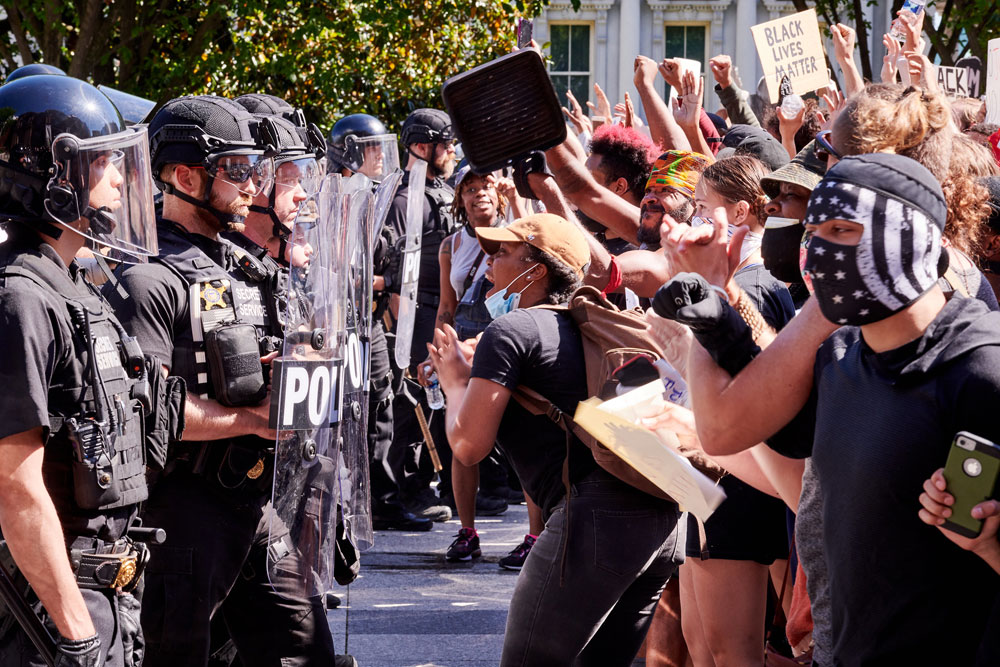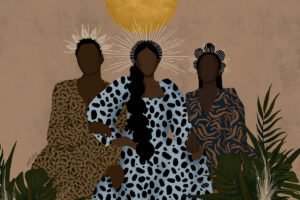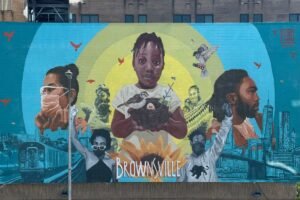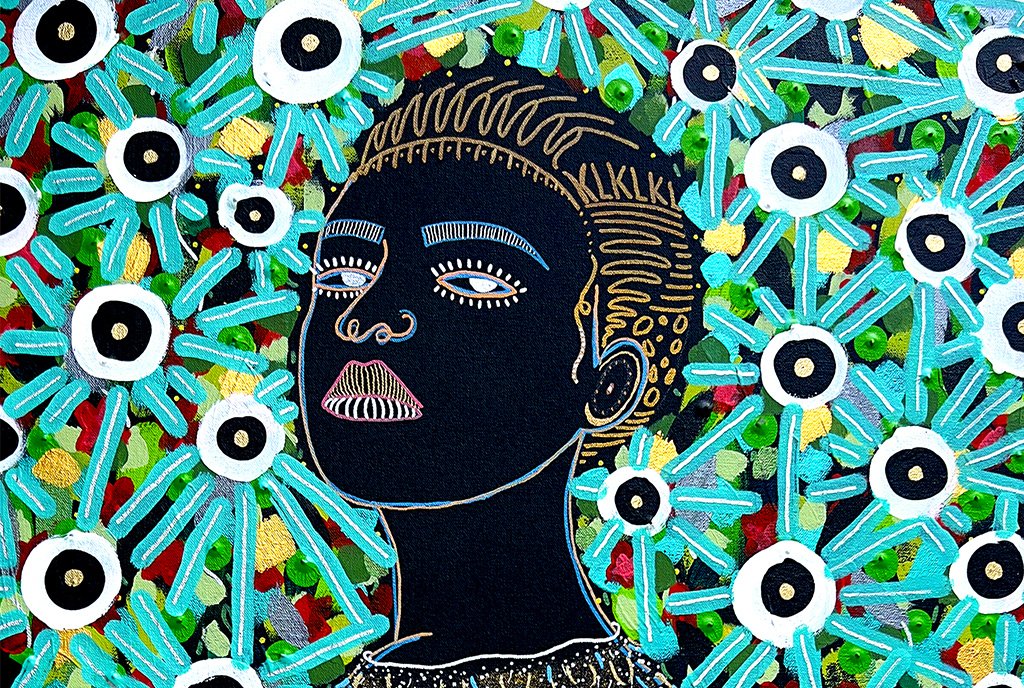
The country is on fire—right now—yet again. It is on fire with a righteous rage that has come from living under the constant threat of Black death, under the constant fear of state-sanctioned racial violence at the hands of law enforcement and vigilantes. But we as a country have been here before many times. About five years ago, social justice foundations and progressive donors proudly proclaimed that Black lives mattered and that they would put significant resources behind building the capacity of Black-led and Black-centered organizing happening in communities across the country.
Philanthropic organizations had been deeply moved by witnessing both the militarized violence and force utilized by federal, state, and local agencies in Ferguson, Missouri, after the 2014 killing of Michael Brown by Ferguson police officer Darren Wilson. Not only did philanthropy witness the horrific death of another Black person at the hands of law enforcement, but it also witnessed the power of social movements when they are able to be nimble, responsive, strategic, and driven by a calling for change rather than a metric.
The mandate was clear: resource expansive movement infrastructure for strong and nimble organizations to advance racial justice.
These organized efforts focused on several points of struggle and opportunity—criminal justice reform, decriminalization of Black and immigrant communities, increased Black civic participation and political agency, re-enfranchisement of rights for currently and formerly incarcerated peoples, training up of emergent Black leadership in communities across the country, narrative change work, and so on. National philanthropic institutions, donors, and funding collaboratives showed up.
It did not however take long for philanthropy to begin to shift its priority from funding Black-led movement to funding specific interventions it thought were best for Black communities. This distinction may seem minor, but it has proven to be critical in how resources would flow to Black-led organizing work and who determined what was ultimately the best approach. Less than three years after Mike Brown passed, the philanthropic commitment for Black-led movement work had largely unraveled.
There was, I believe, a flashpoint that led to this notable shift: the 2016 election of Donald Trump. After the election of the United States’ 45th president, much of the world, social justice movements, and the philanthropies that support them seemed upended.
For many, the election of Trump was inexplicable, confusing, and unfathomable. For others, it was not that surprising, knowing and personally experiencing this country’s legacy of white supremacy and racial terror.
As social movements for communities of color, for immigrants, for women, for LGBTQI folks, and for Indigenous communities all came under increased attack by the administration, the majority of philanthropic organizations stretched their existing budgets to meet broader needs. This led to both formal and informal de-prioritization of funding Black-led movement work across America.
The effect has been devastating. In the years that followed, efforts to build organized power in Black communities have waned due to the withdrawal of philanthropic support. Grants and donations shifted and were spread across a myriad of issues, interventions, and newly deemed opportunities. Yet strengthening the infrastructure to meet these movement moments was no longer the focus.
So, here we are:
- 25-year-old Ahmaud Arbery was shot and killed by two white civilians in Brunswick, Georgia in late February while jogging. Arrests and charges were not conducted until May, once video of the killing was released and shared on social media.
- Breonna Taylor, a medical first responder, was shot eight times and killed in her own home by Louisville police officers in mid-March of this year. The FBI opened an investigation in May. Protests have been sparked across Kentucky’s largest city and have been met with more police violence against demonstrators.
- And we have 46-year old George Floyd, choked to death last week by a Minneapolis police officer’s knee—on camera during a horrifying eight minutes. Only after local and national outcry did the mayor terminate the four officers involved, and did the county bring the restraining officer Derek Chauvin into custody. With Floyd’s murder, a movement opportunity has once again been ignited to end anti-Black racism in America.
Whether at the hands of law enforcement or vigilantes, these people are now dead—not because of something they did, but because of who they were: Black.
To my colleagues in philanthropy, let’s all recognize that anti-Black racism and white supremacy are the bedrock of every single social injustice we aim to address. Be it housing, education, wages, gender justice, civic engagement, LGBTQI freedom, immigration, hunger, poverty, culture, you name it.
My call to philanthropy: fund racial justice. Fund the hell out of it. Fund racial justice work that centers organizing and power-building to counter anti-Blackness. Fund racial justice work that centers the lived experiences, leadership, and communities of Black people. Fund spaces that foster a radical imagination and the creation of new ways of being that could potentially replace centuries of systemic and structural racist practices in our society.
And have the staying power to give Black activists and allies the space to develop effective organizing strategies to achieve lasting change.
Understand that our specific programmatic interventions and strategies must serve a larger collective vision. Our struggle is mutual—and our liberation is mutual. Our collective liberation cannot fully be realized until Black people are free. When we take our focus off of addressing anti-Blackness, Black death continues to happen. Threats to Black life continue to happen. Amy Cooper continues to happen.
Black lives have always mattered.
Black lives mattered last week when Amy Cooper called the police to make false allegations of being “threatened” by an “African American man” in New York City’s Central Park.
Black lives mattered last week when Tony McDade, a Black trans man, was shot and killed by police in broad daylight in Tallahassee, Florida.
Sign up for our free newsletters
Subscribe to NPQ's newsletters to have our top stories delivered directly to your inbox.
By signing up, you agree to our privacy policy and terms of use, and to receive messages from NPQ and our partners.
Black lives mattered earlier this spring when data began to show that the mortality rate for COVID-19 is double that for Black people than for white people.
Black lives mattered in 2005 when the levees broke in New Orleans, flooding Black and low-income neighborhoods and leaving thousands of residents stranded on rooftops and in football stadiums pleading for help from FEMA after Hurricane Katrina.
Black lives mattered when Guinean immigrant Amadou Diallo was shot 41 times by four plainclothes New York City police officers in 1999.
Black lives mattered when 14-year old Emmett Till was lynched in 1955 after being accused of offending a white woman in a grocery store in Mississippi.
Black lives have always mattered.
While many white people are feeling discomfort, this is no time for white guilt or white tears. This is the time to acknowledge the white privilege that keeps you safe is a weapon to most of us Black and Brown folk. This is the time to disarm yourself from this weapon of racial privilege. This is the time to gather your white family members, friends, colleagues, and community members and fight for the rights, freedoms, and self-determination of Black people.
Now, think of philanthropy as one big white family. I know first-hand the work that Black people, people of color, and white allies have to do inside of philanthropic institutions in order to move forward a racial justice vision and strategy, both in its grantmaking and its organizational culture. This is the unseen sweat equity that we often put into institutions so that we can do what we consider mission work that can fundamentally change society outside of these institutions.
Institutional philanthropy needs to acknowledge how it benefits from white privilege and commit to actively working to disarm this weapon of privilege before it can earnestly and holistically support racial justice.
Absent continual vigilance, anti-Blackness and white supremacy will subtly sneak into organizational culture and practices. It shows up in the types of groups that are funded and how those groups must be structured. It shows up in how the work of grantee partners is evaluated, and which ones are disproportionately criticized or praised.
It also shows up in narrowing the focus of Black-led organizing efforts to specific program and project areas that fit specific and siloed grantmaking portfolios. It shows up in the silencing and/or removal of foundation staff that speak out against how white supremacy shows up in their own philanthropic institutions. It shows up in the shuttering of entire grantmaking programs and strategies that center Black people and people of color for the sake of issue-specific approaches.
Philanthropy has been down this road far too many times, and we know where it leads—to Minneapolis, to Ferguson, to Tallahassee, to New Orleans, to Central Park.
I’ve been engaged in racial justice organizing, advocacy, and grantmaking for 17 years. I’ve seen some great models that center Black-led organizing in grantmaking and donor organizing, including the Making Black Lives Matter Initiative at Hill-Snowdon Foundation, as well as the Borealis Philanthropy’s Black-Led Movement Fund. This, however, is not enough. While some aspects of racial justice organizing and movement building are strengthening, so is white supremacy.
Much like a virus, white supremacy is mutating and taking on new shapes that follow flows of capital and power. Philanthropy, we can help quell this by reimagining how our own capital and power can be redistributed to support creating a society where all of us have social freedoms, political agency, and personal autonomy.
Longtime freedom-fighter and codirector of the Highlander Research & Education Center Ash-Lee Woodard Henderson often says, “Fund us like you want us to win.”
In 2019, the Highlander Center—a longtime civil rights institution and training space for Black movement leaders—was the target of a hate crime as white supremacists set its office space on fire in the darkness of night. The very next morning, as news of the fire began to spread and the impacts were becoming realized, the team at the Highlander Center decided to continue on with its meetings and training planned for that day and the coming days. This brave and unapologetic decision was rooted in a politic and a belief that the work to fight for racial justice continues, always.
Four years ago, I wrote an article calling on philanthropy to align its giving with Black-led movement strategies, to fund deeply and far beyond the use of a social media hashtag or news cycle. I wrote then, “Imagine if institutional philanthropy strengthened its mutual trust with social movements by matching our grantmaking strategies with movement-building principles.”
We didn’t do that—not fully. And the result is that today, the fires of white supremacy have continued to rage, and no one is safe. This moment demands that we respond in unparalleled and unprecedented ways. Before it’s too late.
Will Cordery is an Advisor with Leverage Philanthropic Partners LLC, a board member of the Astraea Lesbian Foundation for Justice, and a member of the Economic Justice Advisory Committee for Nonprofit Quarterly. Will can be reached at LinkedIn and on Twitter.











